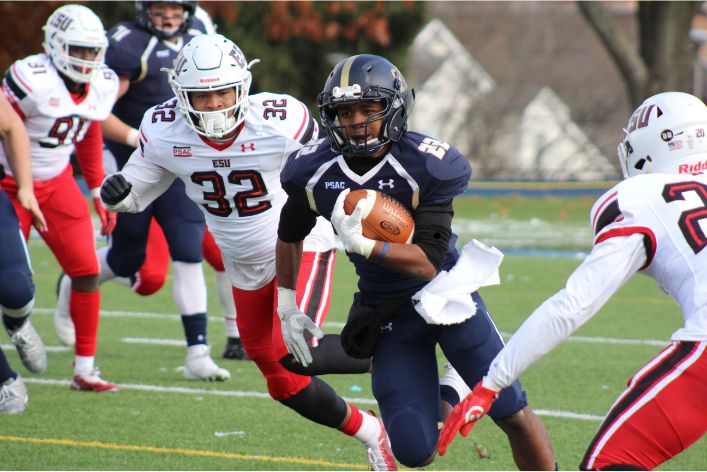Introduction
Fantasy sports have taken the world by storm. Millions of people play fantasy sports every year.
It’s a thrilling mix of strategy, sports knowledge, and competition.
You can create your own team, compete with friends, and even win prizes.
Definition
Fantasy sports let you create a virtual team of real-life players.
You score points based on how those players perform in actual games.
It’s like being a team manager.
You draft players, make trades, and set lineups to outscore your opponents.
Here’s a simple breakdown:
- Draft Players: Select real players for your fantasy team.
- Set Lineups: Choose which players will start each week.
- Score Points: Earn points based on players’ real-world performance.
- Compete: Play against other teams in your league.
Purpose
The goal of this blog post is to provide a comprehensive guide for beginners.
We will cover everything you need to know to get started in fantasy sports.
By the end, you will understand how to draft a team, manage your roster, and compete effectively.
This guide aims to:
- Explain the Basics: Understand what fantasy sports are and how they work.
- Get You Started: Learn how to join a league and draft your first team.
- Teach Strategies: Discover tips and strategies for managing your team.
- Highlight Benefits: See the fun and social aspects of playing fantasy sports.
Fantasy sports combine the excitement of real sports with strategic decision-making.
Whether you love football, basketball, baseball, or another sport, there’s a fantasy league for you.
Get ready to dive into the world of fantasy sports and enhance your enjoyment of the game.
By the end of this guide, you’ll be ready to join a league, draft a winning team, and enjoy the thrill of fantasy sports. Let’s get started!
What Are Fantasy Sports?
Concept
Fantasy sports allow you to become the manager of a virtual team.
You draft real-life players to form your fantasy team.
Each week, you set your lineup by choosing which players will start.
Players earn points based on their real-world performance.
Your team’s success depends on how well your players perform in actual games.
The goal is to score more points than your opponents.
This requires strategic decisions, like making trades and picking up free agents.
Here’s a step-by-step breakdown:
- Draft Players: Select athletes for your fantasy team.
- Set Lineups: Decide who will play each week.
- Score Points: Earn points based on players’ real-world stats.
- Compete: Face off against other teams in your league.
History
Fantasy sports have a fascinating history.
The concept began in the 1960s with fantasy golf. In 1962, the first fantasy baseball league, called the “Schenectady Fantasy Baseball League,” was created.
The game gained more structure in the 1980s with the invention of Rotisserie Baseball.
This new format allowed for detailed player statistics and more engaging gameplay.
The internet revolutionized fantasy sports in the 1990s.
Online platforms made it easier to manage teams and track scores.
Put Your Tech Company on the Map!
Get featured on Nicholas Idoko’s Blog for just $200. Showcase your business, boost credibility, and reach a growing audience eager for tech solutions.
Publish NowFantasy football exploded in popularity during this time.
Today, millions of people play various types of fantasy sports.
From basketball to hockey, there’s a fantasy league for every sport.
Popularity
Fantasy sports have seen tremendous growth over the years.
Initially, they were a niche hobby for sports enthusiasts.
However, the advent of the internet and mobile apps changed everything.
Online platforms simplified the process of creating and managing fantasy teams.
This accessibility led to a surge in popularity.
Several factors contribute to the rise of fantasy sports:
- Technology: Internet and mobile apps make fantasy sports easily accessible.
- Community: Players enjoy the social aspect and community engagement.
- Competition: Fantasy sports provide a competitive outlet for fans.
- Entertainment: They add an extra layer of excitement to watching sports.
Fantasy football is the most popular form of fantasy sports. Millions of people participate in fantasy football leagues every year.
Fantasy basketball, baseball, and hockey also have large followings. Each sport offers unique challenges and strategies.
Daily Fantasy Sports (DFS) have further boosted popularity.
Unlike season-long leagues, DFS contests last just one day or week.
Players draft a new team for each contest, adding variety and instant gratification.
Companies like DraftKings and FanDuel dominate this market.
Fantasy sports have become a significant part of the sports industry.
They generate billions in revenue and have a massive fanbase.
Major sports networks and websites dedicate significant resources to fantasy sports content.
This includes player rankings, injury reports, and strategy guides.
Fantasy sports offer a unique and engaging way to enjoy your favorite sports.
They combine strategy, competition, and community in a fun and interactive format.
Whether you’re a casual fan or a sports fanatic, there’s a place for you in the world of fantasy sports.
How Fantasy Sports Work
Drafting
Drafting is the cornerstone of fantasy sports. It’s where you select players for your team.
The draft can be live or automated. In a live draft, participants take turns picking players in real time.
An automated draft assigns players based on pre-set rankings.
The draft order can be random or snake-style. In a snake draft, the order reverses each round.
This ensures a fair distribution of talent. Successful drafting requires research and strategy.
You need to know player statistics, injuries, and potential.
Teams and Leagues
Fantasy sports teams and leagues come in various formats.
Teams consist of a roster of players from a specific sport. Leagues can be public or private.
Put Your Tech Company on the Map!
Get featured on Nicholas Idoko’s Blog for just $200. Showcase your business, boost credibility, and reach a growing audience eager for tech solutions.
Publish NowPublic leagues are open to anyone, while private leagues are invitation-only.
Each league has a commissioner who sets the rules and manages the league.
There are different types of leagues, including:
- Head-to-Head: Teams compete against each other weekly.
- Points Leagues: Teams accumulate points throughout the season.
- Rotisserie Leagues: Teams are ranked based on cumulative stats in various categories.
Forming a league involves choosing the league type and setting the rules.
Participants then draft their teams and compete according to the league format.
Scoring Systems
Scoring systems in fantasy sports vary widely.
The most common systems include:
- Standard Scoring: Players earn points based on specific actions, like touchdowns or home runs.
- PPR (Points Per Reception): Players receive points for each reception in addition to standard scoring.
- Custom Scoring: Leagues can customize scoring rules to fit their preferences.
Each league should clearly define its scoring system before the draft.
Understanding the scoring system helps in making strategic decisions during the draft and the season.
Managing Your Team
Managing your fantasy team requires regular attention and strategic moves.
Each week, you set your lineup based on matchups, injuries, and player performance.
Key aspects of team management include:
- Weekly Lineups: Choose which players will start each week.
- Trades: Negotiate trades with other league members to improve your roster.
- Waiver Wire: Add and drop players who are not on a team.
Staying active and informed is crucial for success.
Monitor player news, injuries, and performance trends.
Making timely moves can be the difference between winning and losing.
Weekly Lineups
Setting your lineup involves selecting the best players for each position.
Consider matchups, player form, and injuries.
It’s essential to make these decisions before the weekly deadline.
Trades
Trades allow you to improve your team by acquiring better players.
They involve negotiation and strategy.
Ensure trades benefit your team without giving up too much value.
Waiver Wire
The waiver wire lets you add free agents to your roster.
Players not drafted or dropped by other teams are available.
Prioritize players based on potential impact and team needs.
Understanding how fantasy sports work is key to success.
Drafting, forming teams and leagues, knowing scoring systems, and managing your team are crucial elements.
With this knowledge, you can enjoy the excitement and strategy of fantasy sports.
Dive in, draft your team, and start competing!

Types of Fantasy Sports
Fantasy sports come in two main types: Daily Fantasy Sports (DFS) and Season-Long Fantasy Sports.
Each type offers unique features and gameplay experiences.
Put Your Tech Company on the Map!
Get featured on Nicholas Idoko’s Blog for just $200. Showcase your business, boost credibility, and reach a growing audience eager for tech solutions.
Publish NowUnderstanding these differences will help you choose the right format for your interests and lifestyle.
Daily Fantasy Sports (DFS)
Explanation
Daily Fantasy Sports (DFS) provide a fast-paced, exciting alternative to traditional fantasy sports.
In DFS, contests last just one day or week.
Players draft a new team for each contest, competing against others for cash prizes.
The short duration of contests means you can quickly see results and win rewards.
Differences from Traditional Fantasy Sports
DFS differs from season-long formats in several ways:
- Duration: Contests last one day or week, not an entire season.
- Drafting: You draft a new team for each contest.
- Strategy: Focus on short-term performance and matchups.
- Payouts: Immediate payouts after each contest, not at season’s end.
The quick turnaround in DFS appeals to those seeking instant gratification.
It also allows you to play whenever you have time, without long-term commitments.
Season-Long Fantasy Sports
Explanation
Season-long fantasy sports involve managing a team over an entire season.
You draft your team before the season starts and compete in weekly matchups.
Success requires strategic planning, consistent management, and in-depth knowledge of the sport.
The long-term aspect adds depth and engagement, making each game more meaningful.
Key Features
Season-long fantasy sports have several key features:
- Drafting: Draft a team before the season begins.
- Weekly Lineups: Set your lineup based on matchups and player performance.
- Trades: Negotiate trades with other league members to improve your team.
- Waiver Wire: Add and drop players who are not on a team.
- Playoffs: Compete in playoffs at the end of the season to determine the champion.
Drafting is a critical component of season-long leagues.
You must research players, consider their potential, and draft strategically.
Setting weekly lineups involves analyzing matchups, injuries, and player performance.
Trades and waiver wire moves require negotiation and strategy to enhance your team.
The playoffs add an exciting conclusion to the season, where the best teams compete for the championship.
Season-long leagues foster a sense of community and ongoing competition.
They offer a deeper, more immersive experience for those who enjoy long-term strategic planning.
Comparing DFS and Season-Long Fantasy Sports
Both DFS and season-long fantasy sports have their unique appeals.
Here’s a quick comparison to help you decide which is right for you:
- DFS:
- Short-term contests
- Immediate payouts
- Draft new teams frequently
- Focus on matchups and short-term performance
- Short-term contests
- Season-Long:
- Long-term engagement
- Strategic drafting
- Weekly management
- Trades and waiver wire moves
- Playoffs at season’s end
- Long-term engagement
Choose DFS if you prefer quick results and flexible play.
Opt for season-long leagues if you enjoy deep strategy and long-term competition.
Both types of fantasy sports offer unique and exciting experiences.
Whether you choose DFS or season-long leagues, you’ll find plenty of opportunities for fun, strategy, and competition.
Understanding the differences helps you select the format that best fits your preferences and schedule.
Dive into the world of fantasy sports and enjoy the thrill of managing your team and competing against others.
Popular Fantasy Sports
Fantasy sports cover a wide range of real-world sports, each with unique gameplay and appeal.
Here, we explore the most popular fantasy sports: football, basketball, baseball, and others like hockey and soccer.
Put Your Tech Company on the Map!
Get featured on Nicholas Idoko’s Blog for just $200. Showcase your business, boost credibility, and reach a growing audience eager for tech solutions.
Publish NowFantasy Football
Fantasy football dominates the fantasy sports landscape.
It’s the most popular fantasy sport in the United States.
Participants draft NFL players to form their teams.
Each week, you set a lineup, hoping your players score the most points.
Key Features:
- Weekly Matchups: Teams compete head-to-head each week.
- Scoring: Points are based on player stats like touchdowns and yards.
- Playoffs: The season ends with playoffs to crown a champion.
- Drafting: Strategic player selection at the season’s start.
Fantasy football requires in-depth knowledge of NFL players and strategies.
It’s exciting due to the unpredictable nature of football games.
The weekly matchups keep players engaged throughout the NFL season.
Fantasy Basketball
Fantasy basketball offers a fast-paced and high-scoring alternative.
Participants draft NBA players, aiming to accumulate the most points through player stats.
Key Features:
- Daily Lineups: Frequent games mean daily lineup changes.
- Scoring: Points come from player stats like points, rebounds, and assists.
- Consistency: Success requires consistent player performance tracking.
- Drafting: Strategic selection of versatile players.
Basketball’s regular schedule means frequent opportunities to score points.
This requires constant attention and strategy adjustments.
Fantasy basketball appeals to fans who enjoy a more dynamic and fast-paced fantasy experience.
Fantasy Baseball
Now, fantasy baseball is a long-term strategic game.
Participants draft MLB players and manage their teams throughout the baseball season.
Key Features:
- Season Length: The MLB season is long, requiring sustained management.
- Stats Variety: Scoring includes a wide range of player statistics.
- Daily Adjustments: Regular games necessitate daily lineup changes.
- Drafting: Emphasis on both hitters and pitchers.
Baseball’s daily games demand constant attention to player performance and matchups.
Fantasy baseball is ideal for those who enjoy deep, statistical analysis and long-term strategic planning.
Other Sports (Hockey, Soccer, etc.)
Fantasy sports extend beyond football, basketball, and baseball.
Hockey and soccer also have dedicated fantasy leagues.
Fantasy Hockey:
- Players: Draft NHL players to form your team.
- Scoring: Points based on goals, assists, and other stats.
- Management: Requires frequent lineup changes and strategic moves.
- Appeal: Popular among hockey enthusiasts.
Fantasy Soccer:
- Players: Draft players from leagues like the EPL or MLS.
- Scoring: Points for goals, assists, and clean sheets.
- Management: Weekly lineup changes based on matchups.
- Appeal: Ideal for global soccer fans.
Other fantasy sports include golf, NASCAR, and even esports.
Each offers unique gameplay and strategic elements.
They cater to fans of specific sports looking for a fantasy experience.
Key Considerations for Choosing a Fantasy Sport:
- Interest: Choose a sport you are passionate about.
- Knowledge: Your familiarity with the sport and its players.
- Commitment: The time you can dedicate to managing your team.
- Community: The availability of leagues and active players.
Fantasy sports offer a variety of options to suit different interests and commitment levels.
Whether you choose football, basketball, baseball, or another sport, you’ll find a rewarding and engaging experience.
Dive into your favorite sport’s fantasy league and enjoy the excitement and strategy it brings.
Read: How do Football Clubs Make Money?
Getting Started
Starting with fantasy sports can be exciting and a bit overwhelming.
This guide will help you choose a platform, join a league, and prepare for your draft.
Choosing a Platform
Choosing the right platform is crucial for a smooth fantasy sports experience.
Popular platforms include ESPN, Yahoo, and the NFL.
Each offers unique features and a user-friendly interface.
Put Your Tech Company on the Map!
Get featured on Nicholas Idoko’s Blog for just $200. Showcase your business, boost credibility, and reach a growing audience eager for tech solutions.
Publish NowPopular Platforms:
- ESPN: Known for its robust features and expert analysis.
- Yahoo: Offers a simple interface and a strong community.
- NFL: Provides comprehensive coverage and official league integration.
Factors to Consider When Choosing:
- User Interface: Choose a platform with an intuitive and easy-to-navigate interface.
- Features: Look for platforms with customizable settings and comprehensive stats.
- Community: A large, active community can enhance your experience.
- Mobile App: Ensure the platform has a reliable mobile app for on-the-go management.
Joining a League
Once you’ve chosen a platform, the next step is joining a league.
You can choose between public and private leagues, as well as free and paid leagues.
Public vs. Private Leagues:
- Public Leagues: Open to anyone; you join a league with random participants.
- Private Leagues: Invitation-only; you play with friends or colleagues.
Free vs. Paid Leagues:
- Free Leagues: No entry fee; play for fun and bragging rights.
- Paid Leagues: Require an entry fee; offer cash prizes and higher stakes.
Consider your preferences and the level of commitment you’re willing to make.
Public leagues are great for beginners, while private leagues offer a more personal experience.
Paid leagues can add excitement but require a financial commitment.
Draft Preparation
Preparing for the draft is essential for building a competitive team.
Thorough research and practice can make a significant difference.
Research and Resources:
- Player Rankings: Study rankings from experts on your chosen platform.
- Injury Reports: Keep an eye on player health and injury updates.
- Team Depth Charts: Understand team lineups and player roles.
- Expert Analysis: Read articles and watch videos from fantasy sports experts.
Mock Drafts:
Mock drafts are practice drafts that help you refine your strategy.
They simulate the actual draft experience and help you understand player values.
Benefits of Mock Drafts:
- Practice: Gain experience with the drafting process.
- Strategy Development: Test different strategies and see what works best.
- Player Familiarity: Get to know the pool of available players.
- Confidence Building: Build confidence for the real draft.
Participate in multiple mock drafts to develop a well-rounded strategy.
Note which players are frequently available at each draft position.
This information can help you make informed decisions during the actual draft.
Key Steps for Draft Preparation:
- Research Players: Know the strengths and weaknesses of potential draftees.
- Monitor News: Stay updated on player news and team developments.
- Practice Mock Drafts: Engage in mock drafts to hone your strategy.
- Prepare a Draft Plan: Have a flexible draft plan and be ready to adjust.
Getting started with fantasy sports involves choosing the right platform, joining a suitable league, and preparing for the draft.
By following these steps, you’ll be well on your way to enjoying the excitement and strategy of fantasy sports.
Dive in, draft your team, and compete with confidence!
Read: Casino Economics: Unveiling the Secrets of a Thriving Industry
Tips and Strategies for Beginners
Starting with fantasy sports can be overwhelming, but with the right tips and strategies, you can quickly become a competitive player.
This section will cover basic drafting tips, managing your team throughout the season, and common mistakes to avoid.
Basic Drafting Tips
Drafting is the most crucial part of your fantasy sports journey.
A strong draft can set you up for success.
Know the Scoring System:
- Understand Your League’s Scoring: Know if it’s a standard, PPR, or custom scoring system.
- Adjust Your Strategy: Tailor your player selections to fit the scoring system.
Research and Rankings:
- Use Expert Rankings: Check multiple expert rankings to get a consensus.
- Study Player Stats: Look at player performance from previous seasons.
- Monitor Injuries: Avoid drafting injured or high-risk players.
Drafting Strategy:
- Prioritize Running Backs and Wide Receivers: These positions typically score the most points.
- Wait on Quarterbacks: Drafting a top quarterback early is not always necessary.
- Balance Your Team: Don’t neglect any position; ensure a well-rounded roster.
Mock Drafts:
- Practice: Participate in mock drafts to refine your strategy.
- Learn Trends: Understand where players are typically selected.
Managing Your Team Throughout the Season
Once you’ve drafted your team, managing it effectively throughout the season is crucial.
Weekly Lineup Adjustments:
- Check Matchups: Start players with favorable matchups.
- Monitor Injuries: Replace injured players promptly.
- Stay Updated: Keep track of player news and updates.
Trades and Waiver Wire:
- Make Smart Trades: Trade to address weaknesses and enhance strengths.
- Use the Waiver Wire: Add and drop players to improve your roster.
- Be Aggressive: Don’t hesitate to make moves that improve your team.
Bye Weeks:
- Plan Ahead: Ensure you have replacements for players on bye weeks.
- Stay Flexible: Be ready to adjust your lineup as needed.
Common Mistakes to Avoid
Avoiding common mistakes can significantly improve your chances of success.
Drafting Errors:
- Don’t Overdraft One Position: Balance your roster instead of loading up on one position.
- Avoid Injured Players: Don’t take risks on players with injury concerns.
Lineup Mistakes:
- Set Your Lineup: Don’t forget to set your lineup before each game week.
- Avoid Favoritism: Base your decisions on stats and matchups, not personal bias.
Inactivity:
- Stay Active: Regularly check your team and make necessary changes.
- Monitor Performance: Keep an eye on player performance and make adjustments.
Ignoring the Waiver Wire:
- Be Proactive: Use the waiver wire to find emerging talents and replace underperformers.
- Prioritize Key Players: Focus on adding players who can make a significant impact.
Overvaluing Names:
- Don’t Rely on Big Names: Focus on current performance rather than reputation.
- Research New Talent: Stay informed about rising stars and potential breakouts.
In a nutshell, by following these tips and strategies, you can navigate the complexities of fantasy sports with confidence.
Draft wisely, manage your team diligently, and avoid common pitfalls.
These practices will help you compete effectively and enjoy the thrill of fantasy sports.
Dive into the season, apply these strategies, and watch your fantasy team thrive!
Read: The Contribution of African-American Athletes to Sports History

Benefits of Playing Fantasy Sports
Fantasy sports offer numerous benefits beyond just playing a game.
They enhance your knowledge of sports, foster social interaction, provide fun and entertainment, and even offer the potential for monetary gain.
Enhancing Your Knowledge of the Sport
Playing fantasy sports significantly boosts your understanding of the sport.
Put Your Tech Company on the Map!
Get featured on Nicholas Idoko’s Blog for just $200. Showcase your business, boost credibility, and reach a growing audience eager for tech solutions.
Publish NowIt requires you to keep up with player stats, team performance, and game strategies.
Research and Analysis:
- Player Statistics: Track individual player performance.
- Team Dynamics: Understand how teams function and strategies they employ.
- In-Depth Knowledge: Learn about injuries, trades, and other factors affecting the sport.
Improved Engagement:
- Follow Games Closely: Watch more games to keep up with your fantasy team.
- Understand Strategies: Gain insights into different playing styles and strategies.
Social Interaction and Community
Fantasy sports create a strong sense of community and social interaction.
They provide a platform to connect with others who share your passion for sports.
Leagues and Friends:
- Join Leagues: Participate in leagues with friends, family, or co-workers.
- Build Relationships: Strengthen bonds through friendly competition.
Online Communities:
- Forums and Groups: Engage with online communities discussing fantasy sports.
- Advice and Tips: Share and receive advice, tips, and strategies.
Fun and Entertainment
The primary reason people play fantasy sports is for fun and entertainment.
The excitement of drafting players, setting lineups, and competing adds an extra layer of enjoyment to watching sports.
Draft Day Excitement:
- Player Selection: Enjoy the thrill of picking your dream team.
- Strategic Planning: Plan and execute your draft strategy.
Weekly Challenges:
- Matchup Excitement: Look forward to weekly matchups against other teams.
- Real-Time Engagement: Experience the highs and lows of real-time performance.
Potential for Monetary Gain
Fantasy sports can also offer monetary rewards.
Some leagues and contests provide cash prizes, making the competition even more exciting.
Cash Prizes:
- Paid Leagues: Join leagues with entry fees and potential cash rewards.
- Daily Contests: Participate in daily fantasy sports contests with cash prizes.
Skill-Based Rewards:
- Strategic Play: Use your knowledge and strategy to win prizes.
- Incentives: Enjoy the added incentive of winning money.
Legality and Fair Play:
- Understand Rules: Ensure you know the rules and legality of paid fantasy sports in your region.
- Fair Competition: Compete fairly and responsibly.
Playing fantasy sports offers a variety of benefits.
It enhances your knowledge of the sport, fosters social interactions, provides fun and entertainment, and offers potential monetary rewards.
By participating in fantasy sports, you engage more deeply with your favorite sports, connect with a community, and enjoy the thrill of competition.
Dive into the world of fantasy sports and experience these benefits for yourself.
Whether you’re in it for the knowledge, the social aspect, the fun, or the prizes, fantasy sports have something to offer everyone.
Read: The Psychology of Sports Betting: Understanding Your Own Biases
Conclusion
Recap of Key Points
Fantasy sports offer an exciting way to engage with your favorite sports.
You draft players, manage your team, and compete weekly.
We’ve covered the basics, including types of fantasy sports, drafting strategies, team management, and benefits.
Now, you’re ready to start your fantasy sports journey.
Encouragement for Beginners
Don’t be intimidated if you’re new to fantasy sports. Everyone starts as a beginner.
Use the tips and strategies provided here. Practice with mock drafts and participate actively.
Enjoy the process of learning and improving. The more you play, the better you’ll become.
Invitation for Questions and Interaction
Feel free to ask questions and seek advice. Join fantasy sports communities to interact with other players.
Share your experiences and learn from others. The fantasy sports community is welcoming and supportive.
Additional Resources
Links to Further Reading
- Fantasy Sports Basics: What is Fantasy Sports? A Beginner’s Guide
- Draft Strategies: 2024 Fantasy Football Draft Strategy
- Player Rankings: Fantasy Football Player Rankings
Recommended Fantasy Sports Tools and Apps
- ESPN Fantasy App: User-friendly interface and expert analysis.
- Yahoo Fantasy Sports: Robust features and a strong community.
- Sleeper App: Innovative features and real-time updates.
Communities and Forums for Fantasy Sports Enthusiasts
- Reddit: Join subreddits like r/fantasyfootball and r/fantasybaseball.
- FantasyPros: Engage with other players and experts.
- Fantasy Footballers Community: Connect with fans and get advice.
In general, fantasy sports are a fun and engaging way to enjoy your favorite sports.
Recap the key points, practice regularly, and join the community.
Use the additional resources to enhance your knowledge and experience.
Dive into the world of fantasy sports and enjoy the excitement and camaraderie it offers.
Happy drafting and good luck!
Before you go…
Hey, thank you for reading this blog post to the end. I hope it was helpful. Let me tell you a little bit about Nicholas Idoko Technologies.
We help businesses and companies build an online presence by developing web, mobile, desktop, and blockchain applications.
We also help aspiring software developers and programmers learn the skills they need to have a successful career.
Put Your Tech Company on the Map!
Get featured on Nicholas Idoko’s Blog for just $200. Showcase your business, boost credibility, and reach a growing audience eager for tech solutions.
Publish NowTake your first step to becoming a programming boss by joining our Learn To Code academy today!
Be sure to contact us if you need more information or have any questions! We are readily available.









